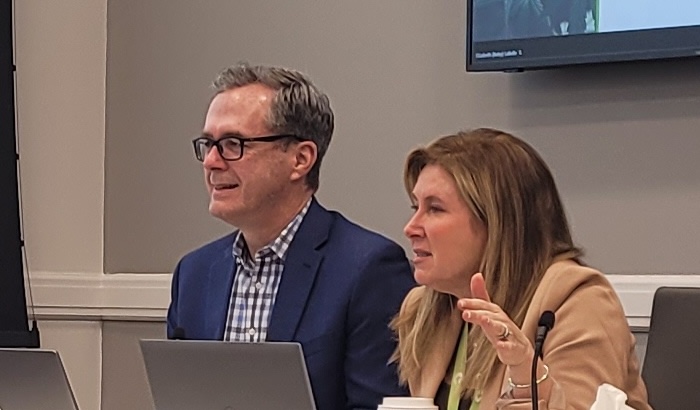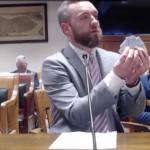
Treasurer appoints Commissioner Bruce Stebbins as temporary chair of Cannabis Commission
Treasurer Deborah Goldberg tried to bring some order to the chaos surrounding the Cannabis Control Commission on Tuesday, but it appears the year-long saga over who will ultimately lead the agency will continue.
Goldberg appointed commissioner Bruce Stebbins as the acting chair of the agency in an attempt to avoid the bickering that has taken place in the past as commissioners jockeyed among themselves for temporary control of the commission. She said Stebbins, who has appeared to be the least interested in amassing personal power, “will ensure stability during this period.”
But even as Goldberg tried to quell the internal infighting at the commission, it became clear that her decision on Monday to fire Shannon O’Brien as the agency’s chair will not be the last word on the matter. O’Brien’s attorney said on Tuesday that she plans to challenge the firing in court, a move that is likely to prolong chaos at the commission and bring all the messy details of the agency into public view.
In firing O’Brien, Goldberg issued a statement saying “the chair committed gross misconduct and demonstrated she is unable to discharge the powers and duties of a CCC commissioner.” She didn’t provide any specifics in her statement, but apparently laid out her findings in an 80-page document she delivered to O’Brien. Neither Goldberg nor O’Brien have released that document.
Goldberg suspended O’Brien with pay in September 2023 due to allegations that she had made “racially, ethnically, and culturally insensitive statements” and created a “hostile work environment.”
O’Brien’s attorneys have argued again and again that the four hearings that the treasurer held, at which O’Brien was given the opportunity to defend herself, were not conducted in a fair manner. They have criticized the treasurer for being involved in the incidents that led to O’Brien’s dismissal – chiefly that the treasurer had a friendly relationship with Shawn Collins, the former Goldberg aide who was appointed executive director of the agency. Collins was the primary complainant in one of the investigations conducted into O’Brien’s conduct.
Ahead of the hearings, Goldberg provided O’Brien with an updated statement of reasons for her suspension. These included O’Brien allegedly making rude and disrespectful comments that were perceived as race-based or “racially, ethnically, and culturally insensitive,” making comments about Collins’s parental leave that were perceived as interfering with the right to parental leave, creating a hostile work environment, bullying Collins with threats, and being evasive with the investigators looking into her behavior.
O’Brien’s attorneys have argued that in all of the charges leveled against O’Brien, there is no evidence that she intended to harm Collins, other commissioners, or the staff.
Max Stern, O’Brien’s attorney, referenced a 1989 court case, Hellman v. Board of Registration in Medicine, in his closing statement during the hearings. The decision in the case defined gross misconduct as “intentional wrongdoing or lack of concern for one’s conduct.” There is a good chance O’Brien will try to argue in court that her behavior does not rise to the level of “gross misconduct” because of the missing crucial element of intent.
There were two separate investigations into O’Brien’s conduct that have hitherto been referred to but kept out of the public eye. O’Brien turned both of the reports over to reporters.
The first investigation was conducted after O’Brien and Cedric Sinclair, the former communications director of the Cannabis Control Commision, accused each other of “harassment, bullying, and discriminatory treatment.”
Sinclair has since left the commission. He was suspended and there were complaints from high-level women staffers alleging that Sinclair harassed and bullied them.
The investigative report cleared both Sinclair and O’Brien of the bullying charges but pointed out that O’Brien frequently made inappropriate comments about the work relationship between Sinclair and Commissioner Nurys Camargo.
The report also contains the allegation that O’Brien made a racially insensitive comment by presuming that a fellow commissioner of color knew Sen. Lydia Edwards of East Boston on the basis of their race. The investigator also noted that O’Brien engaged in similar conduct with her by frequently referencing “high visibility politicians, business leaders and other influential individuals” that O’Brien perceived as sharing the same demographic background with the investigator.
“Having directly experienced similar comments and behavior by the Chair, the undersigned investigator finds Commissioner Camargo’s allegations credible,” the investigator wrote.
Some parts of the investigative report were redacted because they were made by anonymous sources. One comment O’Brien made where she referred to people of Asian descent as “yellow” is not present in the unredacted sections. O’Brien has acknowledged making the “yellow” comment but only in retelling a comment made by a developer of color.
Thomas Maffei, who Goldberg appointed as a presiding officer over the hearings, ruled that the treasurer should not consider the anonymous complaints because that would raise “serious due process issues.” He struck all of the statements attributed to anonymous sources.
The second investigation focused more on the conflict between Collins, the former executive director, and O’Brien. Collins alleged that O’Brien created a “toxic” and “hostile” work environment by interfering with his right to parental leave, threatening to fire him, forcing him to resign, and publicly revealing personal information about him. The investigator for this report focused on the incident where O’Brien revealed in a public meeting that Collins would be going on leave and then leaving the agency.
“It was especially severe and egregious due to both the content and the public setting,” said the report. “She effectively extinguished any chance Shawn could define the terms on which he left the Commission, and she set off a media firestorm from which Shawn feels his career cannot recover. While that remains to be seen, the Chair’s decision to publicly deprive Shawn of a graceful exit from the agency he built and, for the most part, led competently for years cannot be viewed as anything other than bullying behavior.”
For O’Brien’s part, her attorneys argued that she had to announce Collins’s departure because failing to do so would impede the commission’s ability to hire a new executive editor as the agency was drafting and promulgating regulations that were long overdue.
O’Brien also argued that she was concerned that Collins was not doing a good job of managing the agency. In the report, the investigator noted that four out of five commissioners also had concerns about Collins’s performance in the role.
In his closing statement, Stern once again called for a public name-clearing hearing for O’Brien and said that everything would come out into the public anyway.
“When this is over, this privacy is not there anymore,” said Stern “And in whatever — and if there’s a lawsuit, and of course, there will be a lawsuit if we are unable to get the ruling that we think we should get today. Everything will be on the record. Everything will be out there. And we will do everything in our power to clear her name.”
This article was republished from CommonWealth Beacon. You can read the original version here.
























